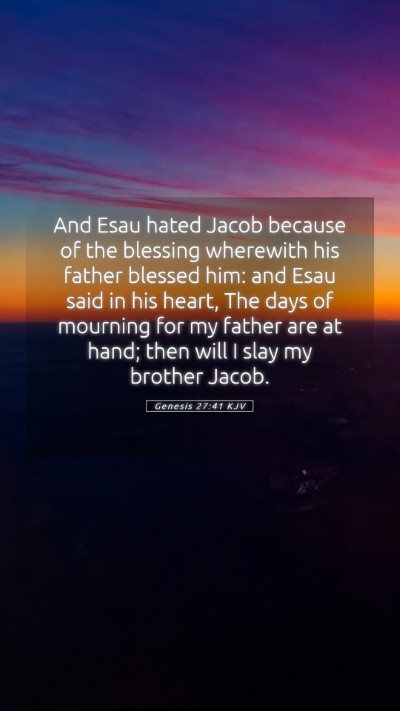Bible Verse Meaning of Genesis 27:41
Genesis 27:41 states, "And Esau hated Jacob because of the blessing wherewith his father blessed him: and Esau said in his heart, The days of mourning for my father are at hand; then will I slay my brother Jacob."
Bible Verse Interpretations
This verse highlights the intense emotions and familial conflicts present in the lives of Jacob and Esau. Esau's hatred towards Jacob, fueled by jealousy and betrayal, indicates the deep divisions that can occur within families over issues of favoritism and perceived injustices.
Insights from Public Domain Commentaries
-
Matthew Henry:
Henry interprets this verse as illustrating the dire consequences of parental favoritism. He suggests that Isaac's blessing of Jacob, which was perceived as rightful by God but deceitful in execution, bred inner turmoil and hatred in Esau. This growing animosity serves as a cautionary tale regarding the impact of familial favoritism, urging readers to recognize the importance of fairness in family dynamics.
-
Albert Barnes:
Barnes emphasizes the psychological impact of Esau's thoughts, highlighting that his inward rage and contemplation of murder represent the extremes to which jealousy can lead. He notes that while Esau expresses a desire for vengeance, it also reveals his sorrow and sense of loss, making this a deeply painful moment in the narrative, touching on human emotions and relationships.
-
Adam Clarke:
Clarke adds a historical context to this emotional conflict, explaining that Esau's fury is indicative of his belief in traditional family inheritance rights, which he felt were usurped by Jacob's manipulations. Clarke's interpretation encourages readers to consider the broader implications of this family conflict, not just its immediate effects but also its long-term impact on the lineage of Israel.
Bible Verse Understanding and Exegesis
The understanding of Genesis 27:41 goes beyond mere conflict; it reflects the struggles of human relationships exacerbated by ambition and the struggle for identity and legacy. The verse’s significance is profound, as it sets the stage for later events in the biblical narrative, including Jacob's flight and Esau's eventual reconciliation.
Applying Bible Verse to Daily Life
The lessons from Esau's anger and Jacob's actions can apply to modern life, especially in contexts involving family disputes, sibling rivalry, and the consequences of deceit. It invites contemporary readers to examine their own relationships, the impact of favoritism, and the importance of open communication within families.
Cross References
- Hebrews 12:16-17 - Warns against being like Esau, who sold his birthright for a single meal.
- Genesis 25:29-34 - The account of Jacob stealing Esau's birthright.
- Genesis 32:3-7 - Jacob's fears before meeting Esau again.
- Malachi 1:2-3 - God’s statement on His love for Jacob and hatred for Esau, reflecting their fates.
- Romans 9:13 - The New Testament reference to God's choices regarding Jacob and Esau.
Conclusion
Genesis 27:41 serves as a poignant reminder of the destructive nature of envy and betrayal, echoing timeless truths about family dynamics and the need for conflict resolution. The insights from various commentaries provide a holistic view of the complexities surrounding this verse, enriching our understanding and prompting deeper reflection on personal and familial relationships.


